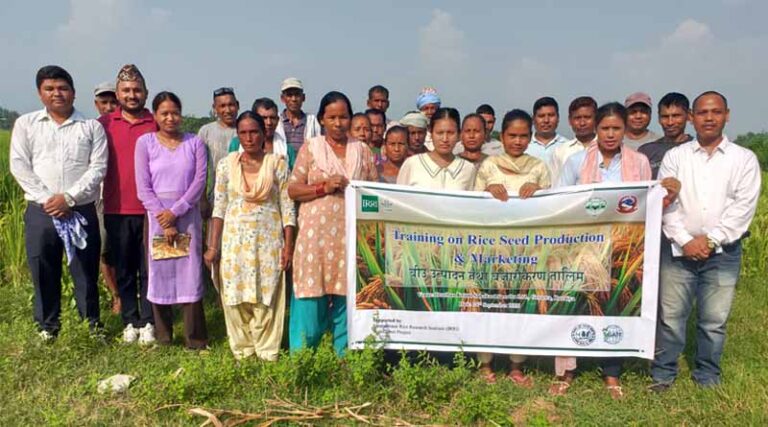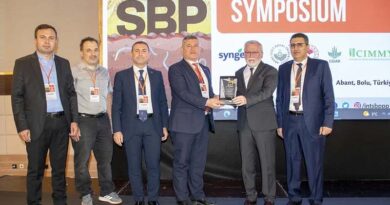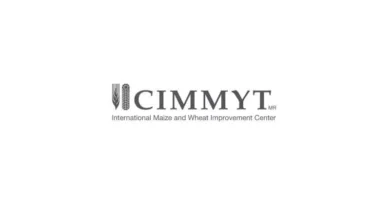
Sowing Partnerships, Harvesting Prosperity: Promoting Sustainable Seed Business Model in Nepal
20 November 2025, Nepal: Rice is more than a staple food in Nepal, it is the foundation of the nation’s food security, nutrition, and rural livelihoods. Yet, despite its central role, Nepal continues to rely heavily on rice imports to meet domestic demand. The underlying challenge lies in the limited access of farmers to quality seeds, modern agricultural inputs, and reliable markets, factors that keep productivity low and food insecurity high.
Most farmers in Nepal still depend on traditional, low-yielding rice varieties that are vulnerable to pests, diseases, and changing climate conditions. The informal seed system dominates, leaving gaps in the supply of high-quality, certified seeds. At the same time, seed production itself is not an easy enterprise. It requires technical know-how, field monitoring, and risk management demands that often discourage smallholders from venturing into the business.Under practical session of QSP training, monitoring seed producer farmers’ fields in Bardiya district with the seed producer farmers, seed laboratory Kajura, Gate Nepal, Muktinath and Digopan cooperative representatives
For many farmers, operational challenges compound these difficulties. Delays in seed collection, inconsistent payments, poor post-harvest handling, and lack of price assurance have made the seed business unattractive, despite its enormous importance to food security.
Recognizing these barriers, the International Rice Research Institute (IRRI), in collaboration with the Nepal Agricultural Research Council (NARC), seed laboratories, local municipalities, agricultural cooperatives, and private seed companies have come together for collective initiative linking scientific research, private sector engagement, and farmer empowerment to strengthen Nepal’s seed value chain.
Through these partnerships, IRRI has distributed foundation seeds of improved and climate-resilient rice varieties while organizing capacity-building programs to enhance farmers’ skills in seed production, quality assurance, and market linkage. The initiative aims to create a self-sustaining ecosystem where farmers, cooperatives, and private companies work together to ensure a steady supply of high-quality seed and fair economic returns.
The collaboration brings together a diverse range of partners, including Global Agri Tech Nepal Pvt. Ltd. (Gate Nepal), Panchashakti Seed Company Ltd., Muktinath Krishi Company Ltd., and cooperatives such as Deuthan Krishi Sahakari Sanstha Ltd., Digopan Samajik Uddami Mahila Sahakari Sanstha Ltd., and Nakaha Krishi Sahakari Sanstha Ltd. Together, these organizations are building trust-based relationships between farmers and buyers, where companies commit to purchasing the quality seed produced locally.
To ensure adaptability across Nepal’s diverse agro-ecologies, seed production activities have been tailored to regional conditions:
- Ghaiya 3 has been promoted for upland and rainfed regions,
- Ganga Sagar 2 for lowland and flood-prone areas, and
- Hardinath 6, a high-yielding, fine-grained variety, for irrigated and medium-land zones.
In the latest cycle, a total of 1,020 kilograms of foundation seed was provided to around 40 seed-producing farmers through participating cooperatives. For instance, Nakaha Cooperative cultivated 150 kg of Ghaiya 3 and 60 kg of Ganga Sagar 2, Panchashakti produced 60 kg of Ghaiya 3 and 150 kg of Hardinath 6, while Deuthan and Digopan Cooperatives each grew 300 kg of Hardinath 6.Under practical session of QSP training, monitoring seed producer farmers’ fields in Kailali district with the Seed Laboratory (Kanchanpur), the Panchashakti seed company, and seed producer farmers.
Private companies have committed to buying back the seeds produced: Gate Nepal from Nakaha and Deuthan cooperatives, Muktinath Krishi from Digopan, and Panchashakti from its associated farmers creating a reliable market linkage and income assurance for seed producers.
To complement this, IRRI organized seed production and marketing training sessions across three major seed-producing clusters, engaging 104 participants, including 90 active seed producers-over 50% of them women. These sessions introduced updated seed production standards, best practices, and quality control techniques, equipping farmers with the knowledge needed to meet formal certification and market requirements.
Agricultural cooperatives have played a pivotal intermediary role, facilitating communication, ensuring timely transactions, and protecting farmers’ interests during price negotiations. This inclusive model has proven that public–private–community partnerships can drive a sustainable seed business that benefits all stakeholders.
By combining scientific innovation with private sector engagement and farmer participation, Nepal is sowing the seeds of self-reliance, one that promises not only higher productivity but also a more resilient and equitable future for its rice farmers.
Also Read: UPL’s Low-Methane Rice Project Wins Global SBCOP Award at COP30
📢 If You’re in Agriculture, Make Sure the Right People Hear Your Story.
From product launches to strategic announcements, Global Agriculture offers unmatched visibility across international agri-business markets. Connect with us at pr@global-agriculture.com to explore editorial and advertising opportunities that reach the right audience, worldwide.






